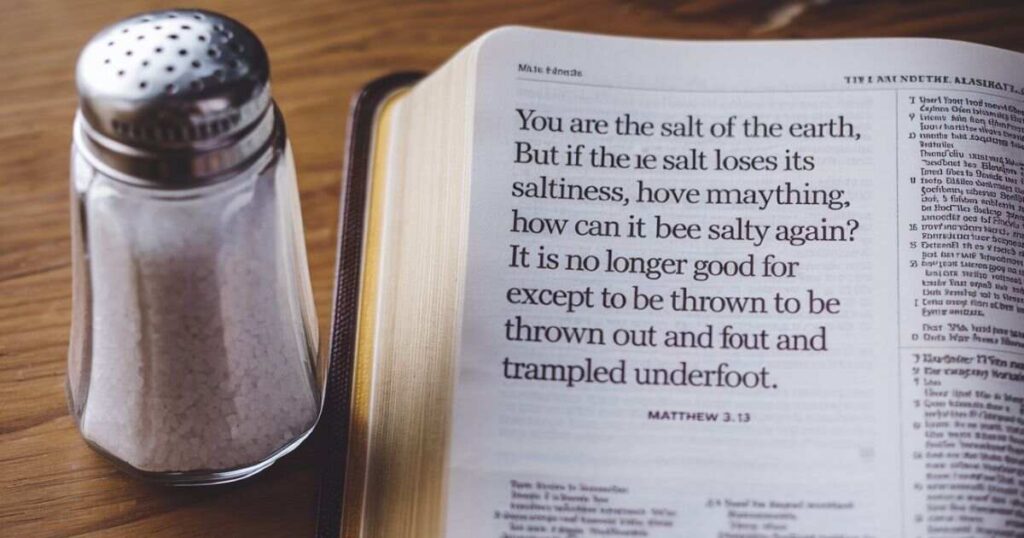Salt holds deep meaning in the Bible. It represents purity, preservation, and God’s covenant with His people. Salt was also used in sacrifices and offerings.
Its spiritual significance goes beyond taste. It symbolizes loyalty, commitment, and a lasting bond with God.
In biblical times, salt was valuable. It preserved food and symbolized faithfulness. Salt is often mentioned in the Old and New Testaments, highlighting its role in spiritual teachings.
Old Testament References
Salt wasn’t just a condiment in biblical times. It was a big deal. The Old Testament is sprinkled with scripture references about salt. These mentions aren’t random. They’re full of religious significance.
In ancient Israel, salt was used in rituals and daily life. It preserved food and added flavor. But it also symbolized important ideas. Purity, preservation, and lasting agreements were all tied to salt. This simple mineral carried a lot of weight in biblical interpretation.
Recomended Blog: Stars-923: A Detailed Overview of the Mysterious Stellar Object
Read Leviticus 2:13 below
“You shall season all your grain offerings with salt. You shall not let the salt of the covenant with your God be missing from your grain offering; with all your offerings you shall offer salt.”
This verse shows how important salt was in worship. God wanted salt in the offerings. Salt represented purity and preservation. It was a reminder of God’s eternal covenant with His people.
Salt as a Covenant
In the Bible, salt often represents divine promises. A “covenant of salt” was an unbreakable agreement. It’s mentioned in Numbers 18:19 and 2 Chronicles 13:5. These biblical agreements were seen as permanent and unchanging, just like salt.
Why use salt for spiritual pacts? Salt doesn’t change easily. It preserves and lasts. So, a salt covenant symbolized a lasting promise. It was a powerful way to show commitment in religious context.
Matthew 5:13
Jesus threw his followers a curveball when he said, “You are the salt of the earth.” What did he mean? This spiritual metaphor is packed with meaning. Salt was valuable, preserving, and flavor-enhancing. Jesus was challenging his followers to be the same in society.
Being “salt” means making a difference. It’s about preserving good and adding “flavor” to life. This Christian teaching calls believers to positive spiritual influence. It’s a call to action, not just a nice saying.
Bible Verses about Salt

Let’s look at some key verses about salt. Each one adds to our understanding of this biblical imagery:
| Verse | Key Idea |
| Colossians 4:6 | Graceful speech |
| Mark 9:50 | Peace and flavor |
| Numbers 18:19 | Everlasting covenant |
| Ezekiel 43:24 | Purification |
These verses show how salt is used as a spiritual representation in different contexts. From speech to peace to purification, salt symbolizes many aspects of faith.
Biblical Nutrition Books
Salt wasn’t just symbolic. It was crucial for survival. Many books explore faith-based diet and biblical nutrition. These works look at how ancient Israelites ate and what we can learn from it.
Salt was key in preserving food. It was also used medicinally. Today, some people follow religious health practices based on biblical eating. They see a connection between spiritual nourishment and physical health.
Meaning of Salt in the Bible
Salt is a multi-layered symbol in the Bible. It represents purity, preservation, flavor, and value. Each aspect adds depth to its spiritual significance. Salt teaches us about God’s character and our role in the world.
In religious symbolism, salt stands for permanence and loyalty. It reminds us of God’s faithfulness. It also challenges us to be faithful and make a positive impact on others.
Salt as a Symbol of Friendship and Loyalty

In ancient times, sharing salt was a big deal. It symbolized friendship and loyalty. This custom gives deeper meaning to the idea of being “worth one’s salt.” It was about being loyal and valuable to others.
This symbolic representation of salt teaches us about relationships. It reminds us to be loyal friends and to value our commitments. In our faith, it can represent our loyalty to God and others.
Salt Adds Flavor
Just as salt enhances food, our faith should enhance life. This spiritual metaphor challenges us to make life “tastier” for those around us. It’s about adding positivity and meaning to our world.
How can we add “flavor” to life? By showing kindness, speaking truth, and bringing joy. This faith expression isn’t about being preachy. It’s about making life better for others in practical ways.
Also Read This Blog: Is Digital Art Ankinsart Professional Tool or Concept?
Salt as a Preservative
In biblical times, salt was crucial for preserving food. This gives us a powerful spiritual metaphor for preserving what’s good in our world. As “salt,” we’re called to preserve truth, kindness, and justice.
This idea of spiritual preservation challenges us. How can we help good things last? By standing up for what’s right, teaching truth, and living out our values. It’s about faith and endurance in a changing world.
Salt as a Valuable Mineral: Worth Its Weight
Salt wasn’t just common in biblical times. It was valuable. Sometimes soldiers were even paid in salt. This gives weight to Jesus’ words about being the “salt of the earth.” He was saying we’re valuable and important.
This religious symbolism reminds us of our worth. In God’s eyes, we’re precious. We have an important role to play in the world. It challenges us to live up to that value by making a positive difference.
Annette on Social Media
Today, we can be “salt” in new ways. Social media gives us platforms to spread positivity and truth. Christian influencers like Annette use these tools to share faith-based content and encourage others.
Being “salty” online means spreading good news, not negativity. It’s about using our influence to preserve what’s good and add “flavor” to people’s online experience. This modern application of an ancient spiritual metaphor shows how timeless these teachings are.
Salt as a Source of Nourishment
Salt isn’t just symbolic. It’s necessary for life. Our bodies need it to function. This physical reality points to a spiritual truth. Just as we need physical salt, we need spiritual nourishment.
How do we “feed our souls”? Through prayer, studying scriptures, and living out our faith. These practices are like spiritual salt, preserving our faith and adding flavor to our spiritual lives. It’s about finding divine nutrition for our inner selves.
How to Be the Salt of the World
Being the “salt of the earth” isn’t just a nice saying. It’s a challenge to live differently. Here are some practical ways to be “salty“:
- Speak with kindness and truth
- Preserve what’s good in your community
- Add “flavor” to life by being positive
- Stand firm in your values
- Be a loyal friend and family member
Conclusion
Salt in the Bible is a powerful spiritual metaphor that goes beyond mere seasoning. It represents purity, preservation, and lasting covenants. Jesus’s call to be “the salt of the earth” challenges believers to make a positive impact, preserving goodness and adding flavor to life.
From Old Testament offerings to New Testament teachings, salt symbolizes our value and purpose. It reminds us of God’s faithful promises and our role in the world. By embracing this biblical symbolism, we can live out our faith in practical, impactful ways, seasoning our communities with kindness, truth, and lasting positive influence.

